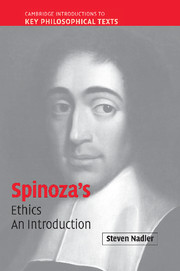Book contents
6 - Knowledge and will
Published online by Cambridge University Press: 05 June 2012
Summary
Writing in November of 1665, just as he was probably nearing completion of a first draft of the Ethics, Spinoza tells Oldenburg,
The human body is a part of Nature. As regards the human mind, I maintain that it, too, is a part of Nature; for I hold that in Nature there also exists an infinite power of thinking which, in so far as it is infinite, contains within itself the whole of Nature ideally, and whose thoughts proceed in the same manner as does Nature, which is in fact the object of its thought.
This “infinite power of thinking which … contains within itself the whole of Nature ideally” is clearly a reference to substance and its attribute Thought and to infinite intellect, the immediate infinite mode of Thought which is the infinite collection of adequate ideas of all things. Spinoza then continues,
Further, I maintain that the human mind is that same power of thinking, not in so far as that power is infinite and apprehends the whole of Nature, but in so far as it is finite, apprehending the human body only. The human mind, I maintain, is in this way part of an infinite intellect.
(Letter 32)The infinite intellect “apprehends the whole of Nature” just because it is composed of infinite ideas, each of which is of some object in one or another of the attributes and which together are of all objects in all the attributes.
- Type
- Chapter
- Information
- Spinoza's 'Ethics'An Introduction, pp. 154 - 189Publisher: Cambridge University PressPrint publication year: 2006



